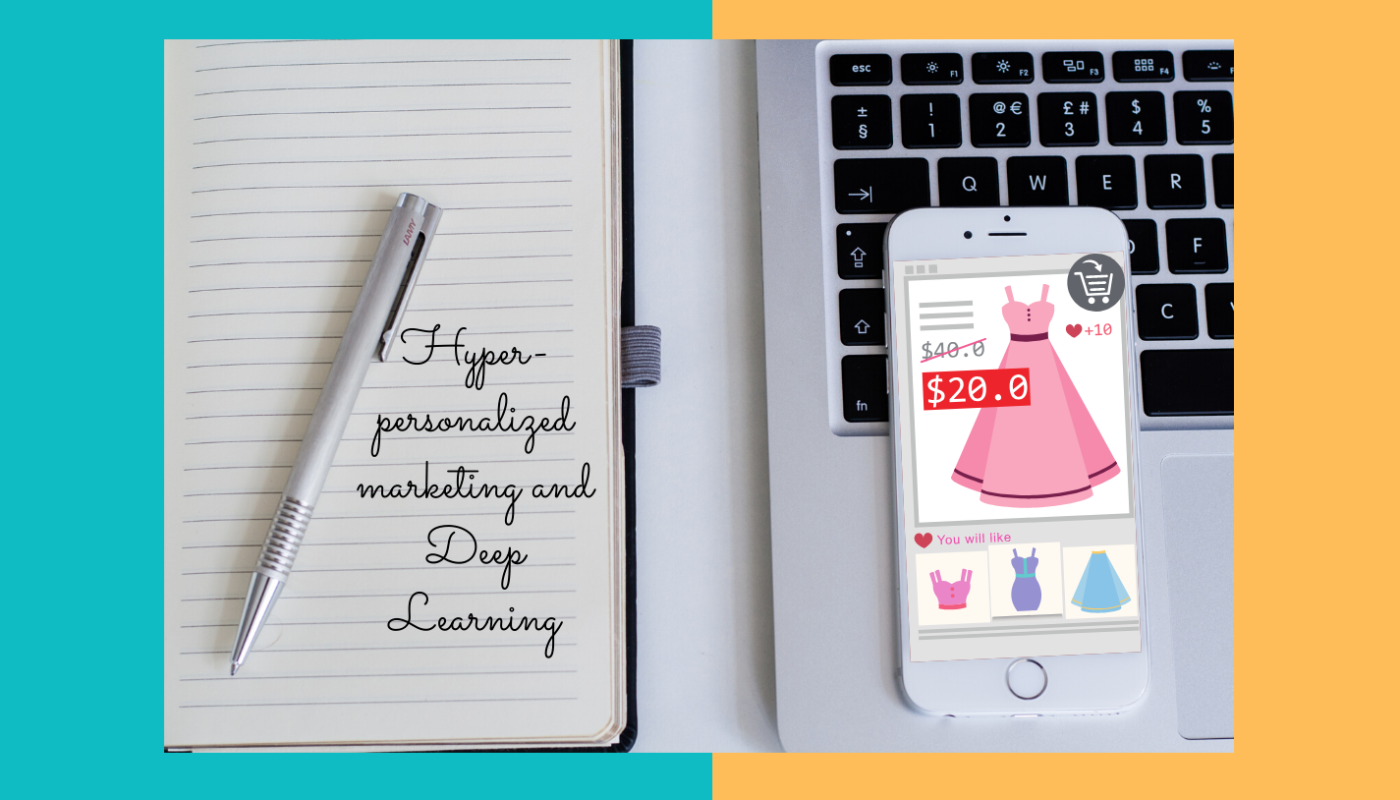Love is all around us – and so Deep Learning is. By quoting the song from the movie Love Actually, I want to introduce this new article about Deep Learning and its massive use made by companies to target customers and provide unique experiences for individuals, also known as personalized and hyper-personalized marketing. Deep Learning is not only behind image recognition, the application on your phone that automatically classifies your photos according to locations, faces or events. Deep Learning is also the reason why you can easily choose a series on Netflix without spending hours scouring the rich collection. Indeed, you can simply check what the recommended for you section has to offer and discover that – Oh, what a coincidence! – it perfectly fits your taste.
But first of all, what is Personalized and Hyper-personalized Marketing?
Personalized marketing, in a nutshell, is the new marketing approach that uses data to customize user experiences, address customers by name, incorporate transactional and purchase history information into the communication. The most common example is receiving a newsletter that is addressing you by your name in the subject line of the email.
Hyper-personalized marketing is the next level and needs to be implemented through Machine Learning algorithms. Machines collect real-time data and behaviors to generate relevant and contextualized communication. This process leads to micro-segmentation, namely the identification of microscopic clusters of individuals who share similar preferences and have a similar lifestyle. Let’s think about Amazon. The e-commerce king has access not only to customers names, contact details, purchase histories but employs other features such as average spend amount or brand affinity.
This personalized and prompt service is not just enjoyable for you as a customer, it literally drives nowadays businesses’ strategies: according to McKinsey, it leads to a 10-20% reduction in marketing costs, a 15-30% revenue and retention improvement and a 3-5% rise in customer acquisition.
How can Deep Learning improve this personalization?
Data, data, and data.
Of course, the more data is available, the better the customization will be. And the more data is available, the more complicated it will be for humans to rapidly identify patterns, maybe even by exploiting real-time information.
Here is where Deep Learning comes in.
Machine learning algorithms simply will collect customers’ data and try to learn as much as possible about a person, in order to provide the most appealing experience, typically by providing recommendations for products or content. Of course, to make the best out of this personalization, marketers should help the machine filtering the most relevant data to consider when preparing the tailored-made offer. But how do machines do that? For instance, by using collaborative filtering: the machine identifies customers with similar purchasing history and habits and recommends products that have been already purchased by these clusters of customers. However, the challenge for many companies is getting to know the customers before that he or she does the first purchase and eventually hand over data like name, contact details and maybe preferences. How can this challenge be overcome? Simply by using Deep Learning. Machines are indeed able to collect in advance all the behaviors of a potential customer which has been identified as such because, for example, has visited the same website from multiple devices from the same local internet.
Let’s come back to our Amazon example. The collaborative filtering algorithm used by the e-commerce platform, suggests products by taking into account your purchase history, the products in your shopping cart, products that you have liked or rated and the products that have been liked or rated by other customers with similar behaviors. The combination of all these factors together generate the perfect product suggestion for you. If you want to know more about how Amazon or other brands use hyper-personalization, check this article here.
Machines help the marketers to obtain the perfect data-based communication and the customer to avoid the time-consuming process of browsing and comparing tons of products. Everything sounds really cool, doesn’t it? But a question might arise…are machines taking over humans’ jobs?!
Of course, machines are making decisions by following a human’s logic (analyze data and find common patterns). However, marketers should always set and monitor the whole process. Machines are indeed not taking over marketers’ jobs, but rather collaborating to scaling up a process that humans will need decades to conclude. Aligning hyper-personalization strategies to the overall business goal is still a task which only humans can carry out.
To sum up, how can Deep Learning help to make the best out of data:
- Providing recommendations not only based on customers’ interaction history but also on intents: machines develop recommendations based on both previously observed behaviors and realtime data to display the right message to the right customer at the right time, by anticipating his or her needs. Therefore future trends can be predicted. For instance, it is possible to know when the customer will make the next purchase, what it’s the right discount to offer and so on.
- Exploiting external factors: not only preferences, purchasing history, tastes are analyzed, but also external factors such as weather, season or current news to customize the perfect message.
And what is your opinion about hyper-personalization? Do you agree that companies are using our data to make our lives easier? Or do you consider it an invasion of privacy? Let me know what you think in the comments section below! 🙂
Sources:
Photo by Margherita Valle
AI, Machine Learning, Personalization, and Automation: What’s the Difference?
Deep Learning and ‘Hyper-Personalization’ are the Future of Marketing Automation
Netflix Has Adopted Machine Learning to Personalize Its Marketing Game at Scale




Hey Margherita, I love you post! On the one hand, I find it pleasant that I don’t have to spend hours trying to find the right product. And it is basically okay for me to disclose data. On the other hand, I’m skeptical whether as a consumer you will be exploited. For example, if I’m looking for a travel destination, will the prices increase the longer I am searching for an offer? But it is a very exciting topic and every marketer should know more about it.
Hi Anja, thanks for your comment 🙂 This topic about plane tickets’ prices and awareness of the mechanism behind is really important. Unfortunately, there is no certain evidence of this correlation. However, what you can do to “prevent” it is setting up private browsing modes, checking the prices as an anonymous user, and carefully reading the cookies policy before accepting it! 🙂 Hope that this could be useful.
Margherita, you are more and more becoming an expert on deep and machine learning – maybe the school can soon hire you as their guest lecturer! Really a well written article, although I have to admit, that not all series in the recommended section in Netflix fit my taste, maybe I confused the algorithm – who knows. Looking forward to your next post! 🙂
Hi Katharina, thanks a lot for your encouraging comment! 🙂 Yes, I know what you mean. The reason is that Netflix algorithm calculates how likely Netflix thinks you are to like a given title. For example, saying that you’re 60% likely to like a series also means that you’re 40% likely to not like it… as you can see, a lot of uncertainty is included in this recommendation! Progress still need to be made to calculate the perfect prediction!
Hi Margherita!
Very insightful article, I think in some cases hypes-personalization is making our lives easier when you are looking for a show or books etc any recommendation online. However, I am definitely more protective and aware when it comes to searches that are related to purchases, for example booking a trip like Anja said in a previous comment. So I tend to look for flight tickets and destinations in incognito mode, so I limit the data the algorithm can learn about me, potentially keeping the prices lower as well.
Hi Eszter, thanks for your comment. I totally see your point, the fact that the plane tickets’ mechanism is unknown and difficult to understand is making many people more cautious about their online behaviors. However, it’s a very difficult topic to explore 🙂
Ciao Margherita, complimenti per l’articolo.
Le problematiche che tu hai evidenziato sono reali e troppo spesso sottovalutate.
È giusto dibatterne anzitutto per prenderne coscienza, e poi per cercare delle soluzioni eque e condivise.
Ciao Giorgia, grazie mille per il commento! Esatto, questi meccanismi esistono e pertanto devono essere chiari e conosciuti da tutti. Più trasparenza permette anche di sapere come i nostri dati sono usati e per quali scopi. Ne parleremo ancora nei prossimi post, spero di rivederti presto! 🙂
Good morning Ms Valle
Once again a wonderfully explained post – well done.
As I read the lines one thought passed my mind – marketers need to become more and more IT specialists, right?
Looking forward to read your next story deepening AI and deep learning.
Hello, thank you very much for your comment!
Yes, you’re right. Marketing is not anymore all about creativity, copywriting, and brand management. New data skills are required especially in terms of data analysis, measurement, and data-based strategy implementation. Of course, Deep Learning can help us scanning all this data, but it’s essential for a marketer to understand the mechanism behind and also to be able to set the adequate goals and measure it properly.
Hope to see you soon on the blog!
Brava Margherita. Sei riuscita a rendere interessante e comprensibile un argomento non facile per i “non addetti ai lavori”. Soprattutto riesci a stimolare il pensiero su come queste nuove opportunità possano incidere sulle nostre vite, con tutte le implicazioni di ordine etico che stanno alla base di certe scelte.
Mi aspetto di poter vedere presto tuoi nuovi lavori.
Grazie Fabrizio, sono contenta di sapere che i miei articoli stimolano la riflessione. E’ sicuramente un argomento vasto e con infinite implicazioni, ma anche averne una parziale conoscenza può fare la differenza. Penso sia importante capirne le dinamiche e soprattutto sapere che influenza ed influenzerà sempre di più le nostre vite. Al prossimo post allora, grazie!
A very interesting food for thought! In my opinion the internet world enjoys a very high data transmission speed. There are so many advantages, but when it comes to violating privacy, the boundary between advantage and damage to the customer is narrowed. In this context, where the speed of change is increasingly impressive, the law must guarantee maximum customer protection. Marketing must go in the same direction as the right to the processing of personal data and companies have a moral duty not to abuse their know-how.
Dear Agnese, thanks for your comment. Of course, this is a real issue and unfortunately not so easy to solve. When ethics and privacy are involved is always hard to find the universally accepted solution. However, being transparent, informing customers about the purposes of data collection, using data only for the mentioned purposes, eliminating data once they are no longer used, are general correct behaviors to implement when working with data. However, since a comprehensive law does not exist yet, some companies are still taking advantage of the system’s inefficiencies. Let’s see how the situation will evolve!